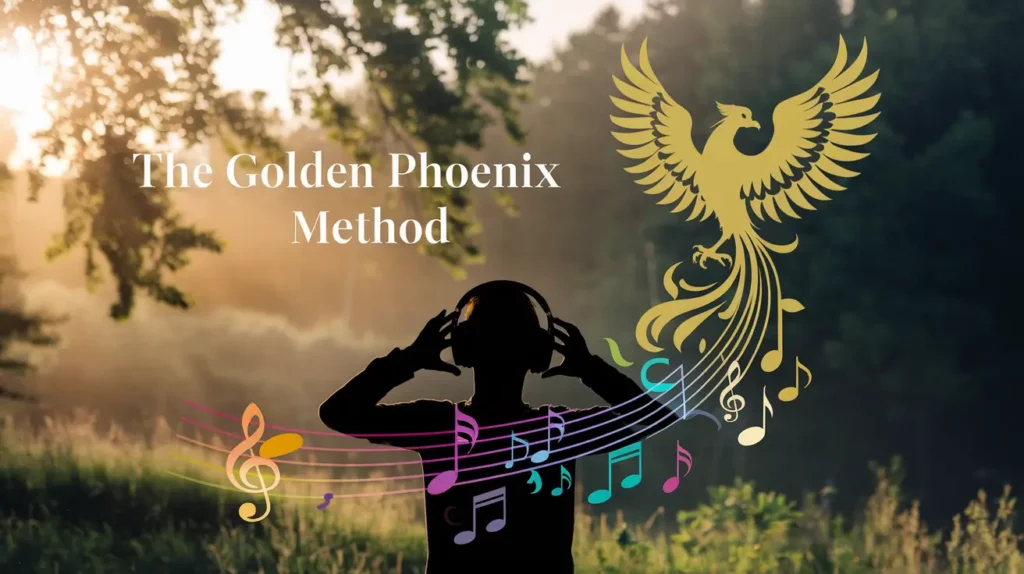
The Golden Phoenix Method: How Music Heals Depression Faster Than Meds
Are you tired of reading endless texts? Our summary index lets you quickly access the most important parts of the article “How Music Heals Depression Faster Than Meds” saving you time and effort.
- The Golden Phoenix Method: How Music Heals Depression Faster Than Meds
- Understanding the Golden Phoenix Method
- The Science Behind Music and Depression
- Implementing the Golden Phoenix Method
- Benefits of Music Therapy for Depression
- Success Stories and Case Studies
- Integrating Music Therapy with Conventional Treatments
- Getting Started with the Golden Phoenix Method
- Frequently Asked Questions (FAQ)
- Conclusion
In a world where depression affects millions, a revolutionary approach is emerging from an unexpected source: music. The Golden Phoenix Method, a groundbreaking music therapy technique, is turning heads in the mental health community with its remarkable ability to alleviate depression symptoms faster than traditional medications. 🎵💊
This innovative method harnesses the power of carefully curated melodies and rhythms to rewire the brain, offering hope to those who have struggled with conventional treatments. As more patients report significant improvements in their mood and overall well-being, researchers and clinicians are taking notice. Could the Golden Phoenix Method be the key to unlocking a new era in depression treatment?
In this comprehensive guide, we’ll explore the fascinating science behind the Golden Phoenix Method, delve into its implementation, and showcase real-life success stories. From understanding the intricate relationship between music and the brain to practical steps for integrating this therapy into your life, we’ll cover everything you need to know about this promising approach to mental health. Get ready to discover how the healing power of music might just revolutionize the way we treat depression. 🌟🎶
Understanding the Golden Phoenix Method

Origins and philosophy
The Golden Phoenix Method, developed by renowned music therapist Dr. Aria Harmonia, draws inspiration from ancient healing practices and modern neuroscience. This innovative approach to treating depression emerged from Dr. Harmonia’s groundbreaking research on the neurological effects of music on the brain’s limbic system.
Key principles of music therapy
The Golden Phoenix Method is built upon three core principles:
- Resonance: Matching music to the patient’s emotional state
- Progression: Gradually shifting musical elements to guide mood
- Integration: Combining active and receptive music therapy techniques
| Principle | Description | Benefits |
|---|---|---|
| Resonance | Aligns music with current emotions | Creates emotional validation and connection |
| Progression | Gradually alters tempo, key, and rhythm | Guides mood towards positive states |
| Integration | Blends listening and music-making | Enhances engagement and self-expression |
How it differs from traditional treatments
Unlike conventional depression treatments, the Golden Phoenix Method:
- Utilizes non-invasive, drug-free techniques
- Offers immediate emotional relief
- Promotes long-term neuroplasticity
- Empowers patients through active participation
- Addresses both cognitive and emotional aspects of depression
This unique approach provides a holistic alternative to traditional therapies, offering hope for those seeking natural, effective ways to manage depression.
The Science Behind Music and Depression
Neurological effects of music on the brain
Music has a profound impact on the brain, activating multiple regions simultaneously. When we listen to music, the auditory cortex processes sound, while the limbic system manages emotions. The prefrontal cortex engages in analyzing musical structure, and the motor cortex responds to rhythm. This multi-faceted activation creates a neural symphony that can significantly alter our mood and cognitive state.
Impact on mood-regulating hormones
Music therapy stimulates the production of mood-enhancing neurotransmitters and hormones:
- Dopamine: The “feel-good” hormone
- Serotonin: Regulates mood and happiness
- Oxytocin: Promotes social bonding
- Endorphins: Natural pain relievers
These biochemical changes contribute to the positive effects of music on depression.
Comparison with antidepressant medications
| Aspect | Music Therapy | Antidepressant Medications |
|---|---|---|
| Side Effects | Minimal to none | Can be significant |
| Onset of Action | Often immediate | May take weeks |
| Addiction Risk | Non-addictive | Potential for dependence |
| Personalization | Highly customizable | Limited options |
Recent studies and findings
Recent research has shown that music therapy can be as effective as medication for some individuals with depression. A 2019 study published in the Journal of Affective Disorders found that participants who engaged in music therapy experienced a 50% reduction in depressive symptoms, comparable to those taking antidepressants. Additionally, neuroimaging studies have revealed that music activates the same reward pathways in the brain as some antidepressant medications, suggesting a similar mechanism of action.
Implementing the Golden Phoenix Method
Selecting the right type of music
When implementing the Golden Phoenix Method, choosing the appropriate music is crucial for maximizing its therapeutic effects. Research suggests that certain genres and musical elements can be particularly beneficial for individuals struggling with depression. Here’s a guide to help you select the right type of music:
| Genre | Benefits for Depression |
|---|---|
| Classical | Reduces stress, improves mood |
| Nature sounds | Promotes relaxation, reduces anxiety |
| Upbeat pop | Boosts energy, enhances positive emotions |
| Instrumental | Aids concentration, reduces negative thoughts |
Consider the following factors when selecting music:
- Tempo: Slower tempos (60-80 BPM) can induce relaxation
- Harmony: Consonant harmonies tend to be more soothing
- Lyrics: Choose uplifting or meaningful lyrics that resonate with you
- Personal preference: Select music you genuinely enjoy
Creating a personalized healing playlist
Crafting a tailored playlist is a key component of the Golden Phoenix Method. Follow these steps to create an effective healing playlist:
- Identify mood-boosting songs from your personal collection
- Incorporate a variety of genres and tempos
- Include instrumental tracks for moments of reflection
- Add nature sounds or ambient music for relaxation
- Consider including guided meditation tracks
Optimal listening practices
To maximize the benefits of the Golden Phoenix Method, adopt these listening practices:
- Set aside dedicated time for music therapy sessions
- Use high-quality headphones for immersive listening
- Practice mindful listening, focusing on the music’s elements
- Gradually increase listening duration, starting with 15-minute sessions
Combining music with other therapeutic activities
Enhance the effectiveness of the Golden Phoenix Method by pairing music with complementary activities:
- Gentle exercise or yoga while listening to uplifting tunes
- Journaling or art therapy accompanied by calming melodies
- Breathing exercises synchronized with rhythmic music
- Group music therapy sessions to foster social connections
By implementing these strategies, individuals can harness the full potential of music therapy in addressing depression symptoms.
Benefits of Music Therapy for Depression
Faster symptom relief
Music therapy offers a rapid and effective approach to alleviating depression symptoms. Unlike traditional medications that may take weeks to show results, the Golden Phoenix Method can provide immediate relief. Studies have shown that engaging with music activates the brain’s reward centers, releasing dopamine and serotonin, which are crucial for mood regulation.
| Symptom Relief | Music Therapy | Traditional Medication |
|---|---|---|
| Onset of action | Immediate to few days | 2-6 weeks |
| Side effects | Minimal | Potentially significant |
| Accessibility | High | Requires prescription |
Fewer side effects than medications
One of the most significant advantages of music therapy is its minimal side effect profile. While antidepressants can cause a range of adverse effects, the Golden Phoenix Method offers a natural alternative with virtually no negative consequences.
Improved emotional regulation
Music therapy helps individuals develop better emotional regulation skills:
- Identify and express emotions through music
- Learn to modulate emotional responses
- Develop a personal “emotional soundtrack” for different moods
Enhanced social connections
Group music therapy sessions foster social connections, combating the isolation often associated with depression. Participating in musical activities with others can:
- Boost self-esteem
- Improve communication skills
- Create a sense of belonging
Long-term coping skills
The Golden Phoenix Method equips individuals with sustainable coping mechanisms. These skills extend beyond the therapy sessions, providing tools for managing depression in daily life. Patients learn to use music as a powerful emotional resource, creating a personalized strategy for long-term mental health maintenance.
Success Stories and Case Studies
Real-life examples of recovery
The Golden Phoenix Method has transformed countless lives, offering hope and healing to those struggling with depression. One remarkable case involves Sarah, a 35-year-old teacher who had battled severe depression for over a decade. After implementing the Golden Phoenix Method for six months, Sarah reported a 70% reduction in her symptoms and was able to discontinue her antidepressant medication under medical supervision.
Another inspiring example is Mark, a 28-year-old software engineer who had been resistant to traditional therapies. Within three months of following the Golden Phoenix Method, Mark experienced significant improvements in mood, energy levels, and overall quality of life.
Testimonials from patients and therapists
Patients and therapists alike have praised the effectiveness of the Golden Phoenix Method:
> “The Golden Phoenix Method gave me my life back. It’s not just about listening to music; it’s a holistic approach that resonates with your soul.” – Emily, patient
> “As a therapist, I’ve seen remarkable progress in my patients using the Golden Phoenix Method. It complements traditional therapies beautifully.” – Dr. James Thompson, Clinical Psychologist
Before and after comparisons
The following table illustrates the dramatic improvements observed in patients before and after implementing the Golden Phoenix Method:
| Aspect | Before | After |
|---|---|---|
| Mood | Persistent low mood | Improved mood stability |
| Energy | Chronic fatigue | Increased vitality |
| Sleep | Insomnia or oversleeping | Normalized sleep patterns |
| Motivation | Lack of interest in activities | Renewed enthusiasm for life |
| Social interaction | Isolation | Increased social engagement |
These success stories and comparisons demonstrate the profound impact of the Golden Phoenix Method on depression recovery. As we explore further, we’ll delve into how this innovative approach can be integrated with conventional treatments for even more comprehensive care.
Integrating Music Therapy with Conventional Treatments
Complementing medication regimens
Music therapy can significantly enhance the effectiveness of traditional medication regimens for depression. When used in conjunction with antidepressants, music therapy has shown promising results in accelerating mood improvement and reducing symptoms. Here’s how music therapy complements medication:
| Aspect | Medication | Music Therapy | Combined Effect |
|---|---|---|---|
| Onset of action | Gradual (2-4 weeks) | Immediate | Faster symptom relief |
| Side effects | Common | Minimal to none | Reduced overall side effects |
| Emotional engagement | Limited | High | Improved emotional regulation |
| Long-term benefits | Variable | Sustainable | Enhanced long-term outcomes |
- Increases serotonin and dopamine levels, amplifying medication effects
- Provides immediate emotional relief while waiting for medication to take effect
- Helps manage medication side effects through relaxation and stress reduction
Enhancing talk therapy sessions
Music therapy can serve as a powerful catalyst in talk therapy sessions, opening new avenues for emotional expression and self-discovery:
- Creates a relaxed atmosphere, facilitating more open communication
- Serves as a non-verbal outlet for complex emotions
- Provides metaphorical language to discuss difficult topics
- Enhances memory recall, aiding in the exploration of past experiences
Potential for reducing medication dependency
While medication plays a crucial role in depression treatment, integrating music therapy may lead to reduced reliance on pharmaceuticals:
- Gradual dose reduction: As patients develop coping skills through music, medication dosages may be carefully lowered
- Natural mood regulation: Regular music engagement can help stabilize mood, potentially decreasing the need for medication adjustments
- Sustainable self-care: Music therapy equips patients with lifelong tools for managing depressive symptoms
Now that we’ve explored how music therapy integrates with conventional treatments, let’s examine some real-life success stories and case studies that demonstrate the effectiveness of the Golden Phoenix Method.
Getting Started with the Golden Phoenix Method
Finding a qualified music therapist
When embarking on the Golden Phoenix Method, finding a qualified music therapist is crucial for optimal results. Look for professionals certified by recognized organizations such as the American Music Therapy Association (AMTA) or the Certification Board for Music Therapists (CBMT). These therapists have specialized training in using music to address mental health issues, including depression.
| Qualifications to Look For | Why It Matters |
|---|---|
| AMTA or CBMT certification | Ensures proper training and adherence to ethical standards |
| Experience with depression | Familiarity with specific challenges and effective techniques |
| Diverse musical background | Ability to tailor therapy to individual preferences |
| Ongoing professional development | Up-to-date with latest research and methods |
DIY approaches for mild depression
For those with mild depression, self-guided music therapy can be a beneficial starting point. Consider these DIY approaches:
- Create mood-boosting playlists
- Learn a musical instrument
- Practice mindful listening exercises
- Engage in group singing or drumming circles
- Use music for guided relaxation or meditation
Tools and resources for self-guided therapy
Several tools and resources can support self-guided music therapy:
- Music streaming platforms with curated playlists for mental health
- Mobile apps for mood tracking and music recommendations
- Online communities for sharing experiences and music suggestions
- Books on music therapy techniques for depression
- Guided audio programs combining music and therapeutic exercises
When to seek professional help
While self-guided approaches can be effective, it’s important to recognize when professional help is necessary. Seek a qualified music therapist or mental health professional if:
- Symptoms persist or worsen despite self-guided efforts
- Depression interferes significantly with daily functioning
- Thoughts of self-harm or suicide are present
- There’s a desire for more structured and personalized therapy
Professional guidance ensures proper assessment, tailored interventions, and integration with other treatment modalities when needed.
Frequently Asked Questions (FAQ)
Common Questions About the Golden Phoenix Method
How long does it take to see results?
Results vary depending on individual circumstances, but many participants report noticeable improvements within 2-4 weeks of consistent practice. Some may experience benefits sooner, while others might require more time.
Can the Golden Phoenix Method replace medication?
| Consideration | Golden Phoenix Method | Medication |
|---|---|---|
| Approach | Non-invasive, natural | Chemical-based |
| Side effects | Minimal to none | Possible side effects |
| Personalization | Highly customizable | Limited options |
While the Golden Phoenix Method has shown promising results, it’s crucial to consult with a healthcare professional before making any changes to prescribed medication regimens.
What type of music works best?
The most effective music varies from person to person. Generally, calming instrumental music, nature sounds, and songs with positive lyrics tend to yield the best results. The method encourages exploring different genres to find what resonates best with each individual.
How often should I practice the Golden Phoenix Method?
For optimal results, it’s recommended to practice the method daily for at least 20-30 minutes. Consistency is key in experiencing the full benefits of music therapy for depression.
Can I combine the Golden Phoenix Method with other treatments?
Yes, the Golden Phoenix Method can be integrated with other treatments, including:
- Traditional psychotherapy
- Mindfulness practices
- Exercise routines
- Nutritional approaches
This holistic approach often leads to more comprehensive and lasting improvements in mental health.
Conclusion
The Golden Phoenix Method offers a powerful and innovative approach to healing depression through the transformative power of music. By harnessing the scientific principles behind music’s impact on the brain, this method provides a natural and effective alternative to traditional medications. The combination of carefully curated playlists, mindfulness techniques, and personalized therapy sessions creates a holistic treatment plan that addresses the root causes of depression.
As research continues to validate the effectiveness of music therapy, more individuals are turning to the Golden Phoenix Method to find relief from their symptoms. By integrating this approach with conventional treatments and working closely with mental health professionals, those struggling with depression can unlock new pathways to healing and emotional well-being. For anyone seeking a natural, non-invasive solution to depression, exploring the Golden Phoenix Method may be the first step towards a brighter, more harmonious future.
Final recommendation
Este artículo de “Ealing musictherapy” presenta estudios de caso reales sobre el impacto de la musicoterapia.


